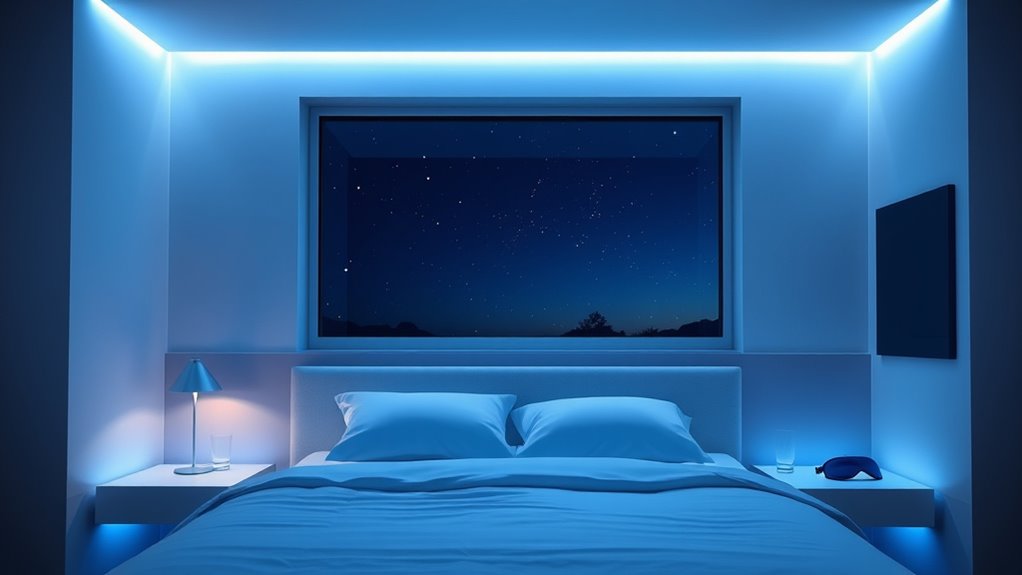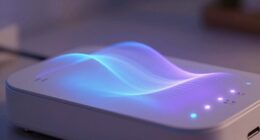A blue-light detox plan helps reset your sleep hormones by reducing screen exposure, especially in the evening. During this 7-day routine, you’ll implement strategies like avoiding screens an hour before bed, using blue-light filters or glasses, and establishing a tech-free wind-down period. Tracking your habits and setting boundaries can substantially improve melatonin production and sleep quality. Keep going to discover practical tips that make this detox effective and easy to follow.
Key Takeaways
- Limit screen exposure one hour before bedtime to reduce blue light’s impact on melatonin production.
- Use blue-light blocking glasses or device settings during evening screen use to protect sleep hormones.
- Establish a consistent daily routine with designated screen-free periods, especially in the evening.
- Incorporate mindful screen habits, such as turning off notifications and setting usage limits, to minimize unnecessary exposure.
- Gradually reduce blue-light exposure over the 7 days to help reset your circadian rhythm and improve sleep quality.

Have you ever wondered how your screen time affects your health? In today’s digital age, many of us spend hours glued to screens, often without realizing the impact on our sleep and overall well-being. That’s where mindful exposure and screen time management come into play. By consciously controlling how much time you spend in front of digital devices, you can considerably reduce your blue-light exposure and give your sleep hormones a much-needed reset. It’s not about eliminating screens altogether but about creating a balanced approach that supports your health.
When you practice mindful exposure, you become more aware of your habits and how they influence your body. For instance, setting boundaries—like avoiding screens at least an hour before bedtime—can help your melatonin levels rise naturally, making it easier to fall asleep. Managing your screen time isn’t just about reducing hours; it’s about quality and timing. Turn off notifications to minimize distractions, and designate specific periods for device use. During those times, try to focus on meaningful activities rather than mindless scrolling. This deliberate approach helps lower your blue-light intake, especially during the evening, when it can interfere most with your circadian rhythm. Additionally, understanding the impact of blue-light on sleep hormones emphasizes the importance of these practices.
Incorporating screen time management into your routine can be straightforward yet effective. Use apps or device settings that track your usage, so you’re aware of how long you’re spending on your phone, tablet, or computer. Set daily limits and stick to them. Consider establishing a “digital sunset”—a specific time in the evening when you power down all screens. This creates a buffer zone that allows your body to wind down naturally. You might also opt for blue-light blocking glasses if you need to be on screens later in the day. These small adjustments can make a big difference in reducing blue-light exposure and helping your sleep hormones regulate properly.
Frequently Asked Questions
Can Blue-Light Detox Improve Overall Skin Health?
Blue-light detox can improve your overall skin health by supporting skin renewal and hormonal balance. Exposure to blue light may cause skin damage and disrupt hormones, leading to breakouts and dullness. By reducing blue light exposure, you give your skin a chance to repair itself and stabilize hormone levels, which can result in a clearer, more radiant complexion. This simple change can make a noticeable difference in your skin’s health over time.
Is This Plan Suitable for Teenagers or Children?
Thinking about whether this plan suits teens or children? While focusing on fostering better sleep hygiene, it’s essential to prioritize teen health, ensuring a balanced approach. Teenagers can benefit from limited screen time before bed, but strict detox plans might be too intense for younger kids. Always consult a healthcare professional before implementing any sleep strategy, especially for growing children, to promote safe, sound sleep and healthy habits.
How Does Blue Light Affect Eye Health Long-Term?
Blue light can cause long-term eye health issues, including blue light damage and eye strain. Prolonged exposure might increase your risk of developing macular degeneration and disrupt your sleep patterns. To protect your eyes, limit screen time, especially before bed, and consider wearing blue light glasses. Regular eye check-ups help catch problems early, ensuring your eyes stay healthy and reduce the risk of long-term damage from blue light exposure.
Are There Specific Foods That Support Sleep Hormone Regulation?
Imagine you’re back in the days of herbal remedies—certain foods truly support sleep hormone regulation. You should focus on dietary antioxidants like cherries, berries, and leafy greens, which boost melatonin naturally. Incorporate sleep supplements such as melatonin or magnesium if needed. These choices help regulate your sleep hormones, making it easier to fall asleep and stay rested. Consuming these foods daily can make a significant difference in your sleep quality.
Can Blue-Light Detox Help With Anxiety or Stress?
You might find that a blue-light detox can help with blue light anxiety and stress management. Reducing screen time in the evening minimizes exposure to blue light, which can interfere with your body’s relaxation signals. By limiting blue light exposure, you support better melatonin production, helping you feel calmer and less stressed. This simple change can improve your overall mental health, making it easier to manage anxiety and stress naturally.
Conclusion
By following this 7-day blue-light detox plan, you’re giving your sleep hormones the reset they need. Remember, change doesn’t happen overnight—think of it as taking small steps to turn the tide in your favor. Stick with it, and you’ll start to notice better sleep, more energy, and a clearer mind. Sometimes, you have to break the cycle to see the light at the end of the tunnel. Keep going—you’re on the right track.










